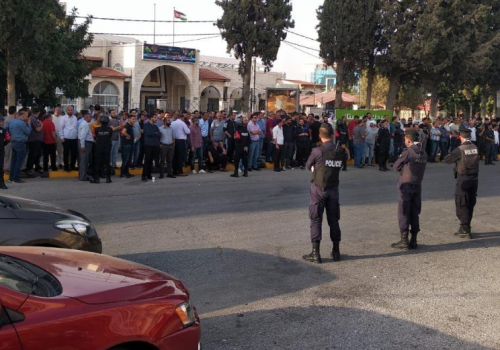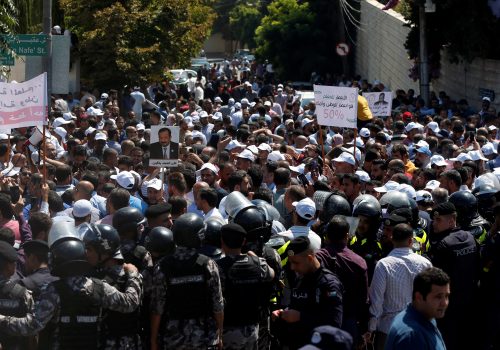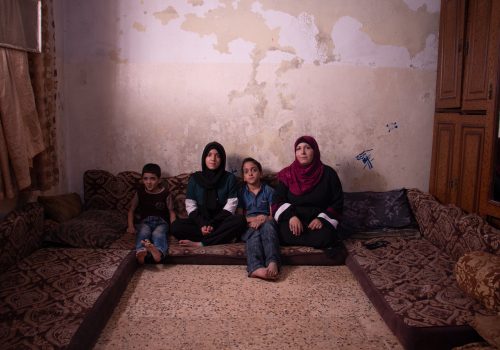Experts React: A royal rift in Jordan amid competing allegations of a coup & corruption
On Saturday, April 3, Jordanian authorities arrested up to twenty people for a nebulous threat to the “security and stability” of the country. The next day, the government accused former Crown Prince Hamzah bin Al Hussein of “destabilizing the country’s security.” In a press conference Sunday afternoon, the Jordanian foreign minister, Ayman Safadi, directly addressed a supposed link between Prince Hamzah, former finance minister Bassem Awadallah, and Sharif Hassan bin Zaid, a relatively unknown junior royal. He hinted that the three had been monitored long enough to determine that they engaged in activities that “targeted the stability and security of the country.” These accusations followed the release of information Saturday night from the prince himself. In a video sent to the BBC, Prince Hamzah alleged that security forces placed him under house arrest, and he was “not allowed to go out, communicate with people or to meet with them.” Jordanian authorities had previously asked Prince Hamzah to refrain from engaging in activities that could undermine national security. In the recording, Prince Hamzah denied any involvement in a conspiracy and went on to criticize the country’s leadership for widespread corruption and an inability to tolerate criticism.
The public unveiling of the Jordanian royal rift is unprecedented. The public naming and accusations leveled against a member of the royal family, especially one as prominent and popular as the late King Hussein’s son and choice of crown prince, is almost unheard of. The country has long been considered a fortified bulwark in the Middle East. However, the COVID-19 pandemic crippled an already fragile economy in a country with limited natural resources, driving a number of recent protests. Popular with local tribes and equipped with an uncanny resemblance to his late father, King Hussein, the prince is well-liked by Jordanians and his accusations of government corruption and incompetence have resonated with many in the country. At the moment, no clear evidence has emerged of the alleged coup, and rumors of foreign involvement remain unsubstantiated. The United States, EU and countries across the region released statements of support for King Abdullah over the weekend. Late Monday, the Royal Hashemite Court issued a statement indicating that King Abdullah II tasked his uncle, Prince Hassan, with mediating the family rift with Prince Hamza, and the latter pledged his full support for the country’s leadership.
Below, Atlantic Council experts react to the latest news of the royal rift in Jordan and how recent events may impact the country’s security, economy, and regional standing.
Jump to an expert reaction:
William Wechsler: US must confront underlying issues that increase Jordan’s vulnerability
Tuqa Nusairat: Political and economic reform have been delayed for too long
Amjad Ahmad: The episode is a distraction from economic challenges
Richard LeBaron: Undemocratic systems are inherently unstable
Borzou Daragahi: Shutting down avenues of dissent makes the system increasingly brittle
US must confront underlying issues that increase Jordan’s vulnerability
“One of the structural challenges for the Middle East is that Jordan is both a linchpin of regional stability and yet is itself inherently unstable. All hereditary monarchies contain within them the latent existential threat of a failed transition of power, and this threat can be especially acute for those whose royal families have modest historical legitimacy and limited distributable wealth. Only through decades of unusually able leadership has Jordan — a relatively poor, militarily weak, and tribally driven state — not only been able to both sustain itself but also been able to contribute significantly to wider security. The US has long recognized the outsized role that Jordan has played in this regard, especially through intelligence and military channels. Unfortunately, given this track record American policymakers have sometimes taken this dynamic for granted, mistakenly assuming that past performance is indicative of future results.”
“While there is still much we don’t know about the specific drivers of recent actions in Jordan, the Biden administration was certainly right to publicly reaffirm US support for King Abdullah in this moment of crisis. As it learns more about the machinations behind recent events and awaits the results of the mediation efforts underway within the Hashemite ruling family, however, the US should turn to quiet diplomacy alongside our friends in the region to help Jordan confront some of the underlying problems that increase the country’s vulnerability. This will include addressing concerns about domestic corruption and the lack of economic opportunities that clearly resonate among many Jordanians.”
William Wechsler, Director of the Rafik Hariri Center and Middle East Programs.
Political and economic reform have been delayed for too long
“By most accounts, what happened in Jordan this weekend was far from an attempted coup. It was, however, the manifestation of two trends the country’s leadership ought to be more proactive about addressing: the rising corruption with a corresponding sense of injustice felt by Jordanians, and the increasingly vocal critiques of the role that said leadership plays in overlooking corruption and downplaying dissent. Most Jordanians were skeptical of the full court press which the government engaged in to rally domestic and international support against what it described as ‘attempts to destabilize the country’s security’ with little evidence to show for it. Prince Hamzah’s final recorded statements appear to speak to the heart of the concerns most Jordanians have about economic hardship, rampant corruption, and an overall deterioration in the country’s ‘progress.’ In the court of public opinion, Prince Hamza appears to have captured the admiration of many Jordanians. The lack of evidence presented by the government of a domestic or foreign-backed plot has only raised more questions. Most in Jordan do not feel their country is or was at risk of such a sinister plot. The greatest risk that remains is that political and economic reform have been delayed for too long, and the little space that remains for Jordanians to express their legitimate frustration and dissent is further narrowed after a member of the royal family was silenced for doing the same.”
Tuqa Nusairat, Deputy Director of the Rafik Hariri Center and Middle East Programs.
The episode is a distraction from economic challenges
“The current rift between the Jordanian Royal family is a distraction from the real issues facing the country. Chronic economic stagnation, low women’s labor force participation, and high unemployment have resulted in discontent amongst a young population yearning for opportunities. The COVID pandemic has amplified the country’s problems and has, unsurprisingly, provided an opening for the opposition, who are likely hoping for Jordan’s young people’s support.”
“The Biden administration quickly supported King Abdullah in the spirit of regional stability. However, stability will only be achieved if we work with our partners on policies and programs that support economic empowerment. King Abdullah may avert a crisis in the short term, but the real problem will not go away.”
Amjad Ahmad, Director and Resident Senior fellow of empowerME.
Undemocratic systems are inherently unstable
“Who knows what is really going on in Jordan? Monarchies are not a model of transparency or accountability. As we rush to the defense of the current monarch, we fail to recognize, or at least don’t want to think about, the inherent instability of these systems. We tout “stability” as a great virtue to be defended, without making much of a judgment about whether what we are witnessing is genuine stability or is simply a result of dictatorships in the region operating at varying levels of efficiency. Or perhaps it’s simply that no one wants another “problem” in the Middle East, and we’d rather just stick with the kings we know. If populations are unsatisfied with their leaders, and have no real role in choosing them or influencing policy, well, that will just have to wait for another day.”
Richard LeBaron, Nonresident Senior Fellow with the Atlantic Council’s Middle East Programs.
Shutting down avenues of dissent makes the system increasingly brittle
“It is understandable that the Jordanian King is nervous and feeling threatened—whether the plot Jordanian officials have so far declined to fully outline is real or not. Despite its image of stability, resource-poor Jordan is riven with political tensions and economic malaise and has been boiling with frustration for many years. The coronavirus pandemic has only worsened the country’s deep economic trouble. The lockdown in the country was among the harshest in the world, demoralizing the country. One path would have been to use the goodwill many Jordanians have for the Hashemite monarchy, open the society and allow different voices to be heard and offer solutions. That has not been the path chosen by King Abdullah II. Instead, he has tightened political controls and shut down avenues of public dissent. This has made the system increasingly brittle, and its leadership increasingly paranoid. It goes without saying that none of these trends will solve any of Jordan’s deep economic and social problems.”
Borzou Daragahi, Nonresident Senior Fellow with the Atlantic Council’s Middle East Programs.
Image: FILE PHOTO: King of Jordan Abdullah II addresses the European Parliament in Strasbourg, France January 15, 2020. REUTERS/Vincent Kessler/File Photo


